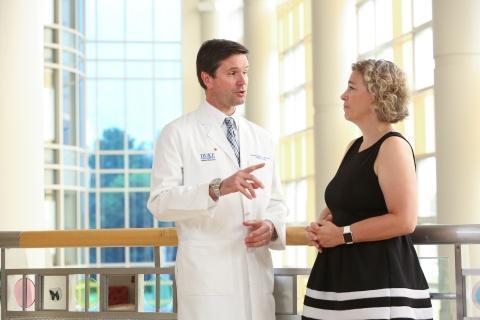
A Holistic Approach in a Divided State
Surgeons frequently influence medical decisions with their novel discoveries and improvements to procedures. Occasionally, the scope of practice extends beyond the walls of the operating room and into the national spotlight of political and social sciences, allowing surgeons to take up a visible position of leadership in the community.
One such opportunity arose within Duke Children’s Hospital in 2015, when Deanna Adkins, MD, founded the Center for Child and Adolescent Gender Care—the first of its kind in North Carolina. Just one year later, the NC House Committee held a special session to pass HB2, which eliminated antidiscrimination protections for LGBTQ individuals and legislated that in government buildings, individuals may only use restrooms and changing facilities that correspond to the sex on their birth certificates.
Associate Professor of Surgery Jonathan Routh, MD, the Pediatric Urologist for the clinic since its inception, frequently treats patients who come in with urological issues caused by “waiting too long to use the bathroom, because they are afraid of being beaten up by their classmates for using the ‘wrong’ bathroom.” Due to situations like these, Routh has become more politically outspoken in this role than he would be under different circumstances.
The Center serves two discrete populations, with the majority being transgender children and teens, “the kids who come in saying ‘no, I’m a boy’ with certainty,” and a smaller group, who are born with differences in sex development (DSD), which is Routh’s area of specialty. DSD is a term used to collectively refer to medical conditions that involve atypical reproductive system development.
For transgender youth, the Center talks them through their medical options, supporting them socially and psychologically. “We can hit the pause button on puberty,” Routh says, explaining that they use hormone blockers to prevent the development of secondary sex characteristics, “giving patients and their families breathing room to process and come to terms with what they really want.”
For patients with DSD, decisions become more complicated. Legally, parents can make decisions regarding their children, but many groups, such as the Intersex Justice Project and the Human Rights Watch, advocate complete bans on all gender surgeries on minors. This generation of adults was “deeply affected and hurt by procedures performed 30 years ago,” Routh says. It was a time before the medical community gained a more nuanced understanding of these issues and physicians began specializing in pediatric urology. Because DSD affects a diverse population, and has a variety of underlying causes, “one-size-fits-all pronouncements tend to be problematic.”
Duke adheres to the current best practice of performing DSD surgeries at age 6–18 months, if and only if medically necessary. Parents find themselves in the positions of needing to “make guesses on what their child, as a future sexual being, would want,” a difficult scenario for most parents to process. This is why Routh promotes team-based care, which looks to treat the family as a unit while putting the child’s needs first.
“We really try to have a considered and conscientious approach,” he says, describing the Center’s guiding philosophy—“explain the options, sit back and listen, and repeat the process as many times as is needed.” They provide not only physical care, but also social services and psychiatric therapy referrals. Parents of children with DSD are dealing with “pregnancy hormones, minimal sleep and a crying infant—these parents then have to go out and deal with a world that may judge or shun them.”
The clinic is currently open 2–3 days a month, and their waiting list is usually 6–9 months. Kristen Rezak, MD, who will join Duke in September, specializes in breast reconstruction surgery and will be a welcome addition to the team. Going forward, Routh would also like to have a social worker on staff during all clinic hours, and he is currently working with the World Professional Association for Transgender Health to understand what might be needed in order for the Center to be able to extend their services to adult transgender patients as well.
“We’ve really tapped into something here; these kids aren’t getting this kind of support from anywhere else.”
“We really try to have a considered and conscientious approach,” Dr. Routh says, describing the Center’s guiding philosophy—“explain the options, sit back and listen, and repeat the process as many times as is needed.”